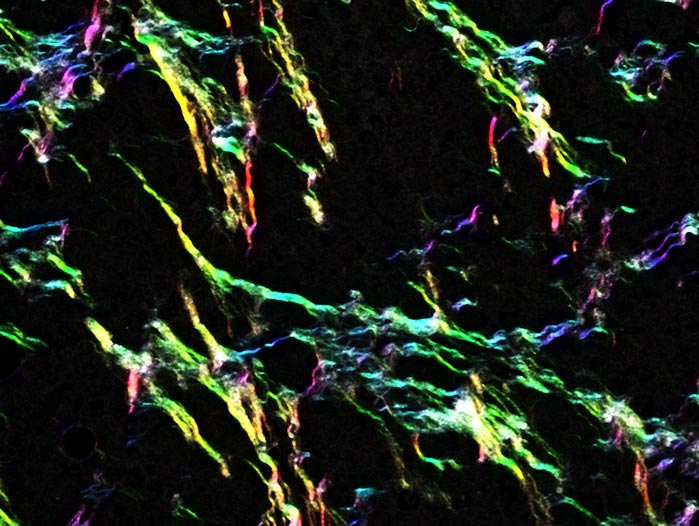Collagen a key player in breast cancer metastasis

Collagen fibres running through a cancer tumour, created using a multiphoton microscope. The colouring is a visual representation of how collagen fibres are organised. Changing levels of collagen XII alters this organisation; increasing collagen XII produces collagen fibres that are thicker and more aligned.
Credit: Matrix and Metastasis Lab, Garvan Institute of Medical Research
The level of collagen type XII in breast tumours plays an important role in triggering the spread of cancer cells around the body.
Collagen type XII plays a key role in regulating the organisation of the tumour matrix, reveals a new study from the Garvan Institute of Medical Research. A team of scientists led by Associate Professor Thomas Cox, Head of the Matrix and Metastasis lab, also discovered that high levels of collagen XII can trigger breast cancer cells to spread from the tumour to other parts of the body, a process known as metastasis.
The tumour microenvironment is the ecosystem that surrounds a tumour, one component of which is the extracellular matrix. Cancer cells constantly interact with the tumour microenvironment, which affects how a tumour grows. Collagen is an important part of this tumour microenvironment, but just how it influences tumours has not been understood.
“There’s still a lot we don’t know about the role of the extracellular matrix in cancer metastasis. Our study shows that collagen XII plays an important role in breast cancer progression and metastasis,” says senior author Associate Professor Thomas Cox.
“Imagine cancer cells as seeds, and the tumour microenvironment as the soil. By studying the soil – the extracellular matrix – we can begin to understand what makes some tumours more aggressive than others, and by extension, begin to develop new ways to treat cancer,” he says.
The research also suggests that measuring the level of collagen XII in a patient’s tumour biopsy could potentially be used as an additional screening tool to identify aggressive breast cancers with higher rates of metastasis, such as in the triple-negative type of breast cancer. Furthermore, collagen XII might be a possible target for future treatments.
The study is published in the journal Nature Communications.
Collagen XII alters tumour environment to help cancer cells invade
The extracellular matrix or ‘matrix’ is a 3D meshwork of around 300-400 core molecules, including several collagen proteins. This matrix provides structural and functional support to cells and tissues in all parts of the body.
In this study, the researchers catalogued how the tumour matrix changes over time and have generated a comprehensive database of these changes, which has been made freely available to researchers.
The team zeroed in on collagen XII, one of 28 types of collagen in the body. Collagen XII plays an important role in organising other collagens and can have profound effects on the 3D structure of the extracellular matrix.
The researchers studied tumours in mouse models from the earliest pre-clinical stages of cancer, right through to late-stage tumours. They found that as the tumours developed, many matrix molecules changed, and importantly the level of collagen XII was also increased.
“Collagen XII seems to be altering the properties of the tumour and makes it more aggressive,” says first author Michael Papanicolaou, from Garvan. “It changes how collagens are organised to support cancer cells escaping from the tumour and moving to other sites like the lungs.”
The team then used genetic engineering to manipulate production of collagen XII, and looked at the effects of metastasis to other organs. They found that as levels of collagen XII increased, so did metastasis. These findings were then confirmed in human tumour biopsies, which showed that high levels of collagen XII are associated with higher metastasis and poorer overall survival rates.
Further research will focus on studying more human samples, and investigating possible therapeutic pathways.
This research was supported by the National Health and Medical Research Council (NHMRC), Cancer Institute NSW, Cancer Council NSW, Susan G. Komen for the Cure, Perpetual IMPACT, Love Your Sister in association with the Australian National Breast Cancer Foundation, Suttons Family, and the Australian Cancer Research Foundation (ACRF) INCITe Centre.
Associate Professor Cox is a Conjoint Professor at St Vincent’s Clinical School, Faculty of Medicine and Health, UNSW Sydney. The Matrix and Metastasis lab is part of the Cancer Ecosystems program at the Kinghorn Cancer Centre, a collaboration between Garvan and St Vincent’s Hospital.
Journal: Nature Communications
DOI: 10.1038/s41467-022-32255-7
Method of Research: Experimental study
Subject of Research: Cells
Article Title: Temporal profiling of the breast tumour microenvironment reveals collagen XII as a driver of metastasis
Article Publication Date: 6-Aug-2022
Media Contact
Carolyn Barry
Garvan Institute of Medical Research
c.barry@garvan.org.au
All latest news from the category: Health and Medicine
This subject area encompasses research and studies in the field of human medicine.
Among the wide-ranging list of topics covered here are anesthesiology, anatomy, surgery, human genetics, hygiene and environmental medicine, internal medicine, neurology, pharmacology, physiology, urology and dental medicine.
Newest articles

Innovative 3D printed scaffolds offer new hope for bone healing
Researchers at the Institute for Bioengineering of Catalonia have developed novel 3D printed PLA-CaP scaffolds that promote blood vessel formation, ensuring better healing and regeneration of bone tissue. Bone is…

The surprising role of gut infection in Alzheimer’s disease
ASU- and Banner Alzheimer’s Institute-led study implicates link between a common virus and the disease, which travels from the gut to the brain and may be a target for antiviral…

Molecular gardening: New enzymes discovered for protein modification pruning
How deubiquitinases USP53 and USP54 cleave long polyubiquitin chains and how the former is linked to liver disease in children. Deubiquitinases (DUBs) are enzymes used by cells to trim protein…



